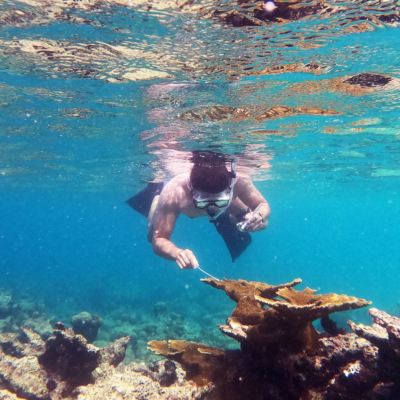Student Spotlight: Brayan Vilanova Cuevas

Photo courtesy of Ian Hewson, Cornell University.
September 5, 2023
Brayan Vilanova Cuevas is a doctoral student in microbiology from Cataño, Puerto Rico. He earned his B.S. in microbiology from the Interamerican University of Puerto Rico and now studies the interactions between pathogenic ciliate, urchins, and the marine environment under the guidance of Ian Hewson at Cornell.
What is your area of research and why is it important?
After the mass mortality event of D. antillarum, a sea urchin, in 2022, we were able to identify the ciliate culprit for the disease. My research is focused on understanding transmission, mechanisms of pathogenesis, and host-microbe interactions between pathogenic ciliate, urchin host, and the marine environment. This will allow us to understand in what environmental conditions the ciliate can proliferate and cause disease, while also shedding light as to how climate change can shift microbial interactions from commensal to pathogenic and have large effects on marine ecosystems.
What are the larger implications of this research?
A lack of echinoderms that keep the balance between algae and coral could result in a major decrease of coral diversity and abundance. This would promote the collapse of marine ecosystems which are incredibly important for numerous industries and our livelihood in general. D. antillarum had been affected once before with a mass mortality event in the 1980s. Researchers believe its significant decrease back then shifted the Caribbean’s ecosystem from coral dominant to algae dominant. Our research is imperative to better understand and develop methods of anticipating how the marine ecosystem will be affected by changes in ecosystem health.
What does it mean to you to have received an NSF Graduate Research Fellowship?
Getting this fellowship makes me proud of the obstacles overcome and where I am headed with my career. It also makes me feel grateful and lucky: Grateful to my professors, mentors, and colleagues from whom I have learned everything that has gotten me to where I am today, and lucky that the reviewers appointed to my fellowship material were receptive and content with my diverse background, scientific journey, and personal and career efforts. This is a luxury not all applicants got this and in past years.
What will your fellowship allow you to do that you may not have been able to otherwise?
The fellowship grants me the freedom from concerns about sourcing funds and enables me to conduct research on subjects that deeply interest me.
President Pollack has designated this academic year’s theme as freedom of expression. What does freedom of expression mean to you?
As a Latino and gay man, valuing freedom of expression is paramount, despite feeling constrained at times. While it’s an essential goal, daily U.S. government policies raise concerns about expressing myself freely, seemingly reserved for specific races and sexual orientations. Coming from an island colonized by the U.S. adds complexity, making self-expression challenging without seeming ungrateful. Yet, true expression remains inaccessible for those oppressed, combating the idea that they’re lesser due to race or sexual orientation, often working doubly hard for equal opportunities. The struggle persists, highlighting the urgency to dismantle systemic barriers and embrace genuine freedom of expression for all.
What are your hobbies or interests outside of your research or scholarship?
Outside of the academic sphere I enjoy photography, hiking, and take dancing classes. All of these allow me to explore my creativity and interact with a diverse group of individuals on a daily basis.
Why did you choose Cornell to pursue your degree?
When deciding where to go to grad school, the microbiology Ph.D. program at Cornell stood out because it didn’t feel like a job or a rigid place of work. People interact with each other with kindness and respect and there is a sense of community that I didn’t experience as strongly in other institutions. Moreover, pursuing my degree in this institution was heavily decided on the incredible faculty members and their growing interest in doing everything they can to make our journey a satisfactory one.
